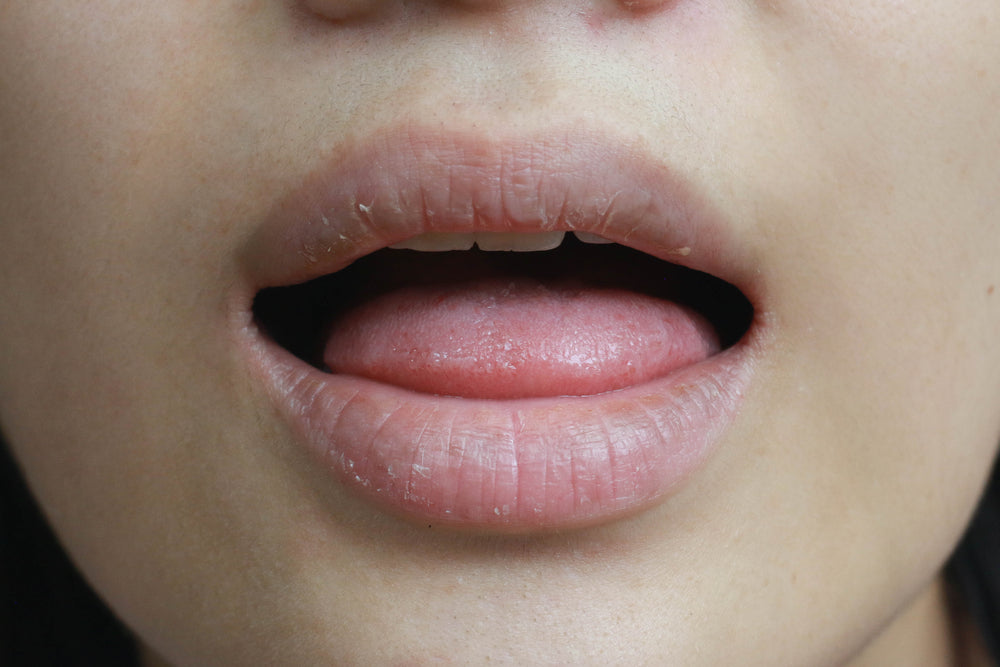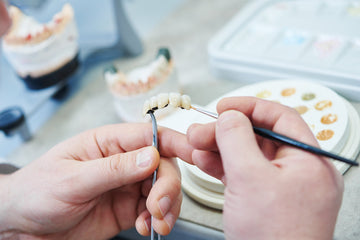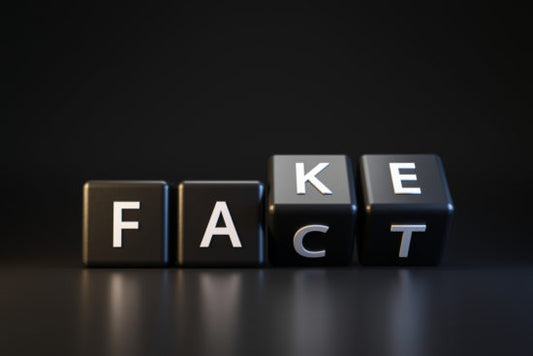Dry Mouth - All the Symptoms, Causes & the Right Treatment

Dry mouth, also known as xerostomia, is more than just an uncomfortable sensation. It can affect your speech, taste, digestion, and overall oral health.
When it happens, it shouldn’t be ignored.
In this guide, Dr Sanjay Patel explains the symptoms, causes, and treatments for dry mouth to help you understand and manage this common condition.
What is dry mouth?
Dry mouth happens when your salivary glands don't produce enough saliva to keep your mouth moist.
Saliva is essential for maintaining your oral health — it helps to neutralise acids and prevent infection.
When saliva production drops, your mouth dries out, leading to discomfort, bad breath, difficulty speaking or swallowing, and an increased risk of tooth decay and gum disease.
What causes dry mouth
Dry mouth can be caused by a variety of things, ranging from lifestyle factors to underlying medical conditions.
Common causes include:
· Medications: Some prescription and over-the-counter medicines can reduce saliva production. Medications like antidepressants, antihistamines, decongestants, and blood pressure medications are the most common culprits.
· Medical conditions: More serious underlying medical conditions, like diabetes and Alzheimer’s disease, can lead to dry mouth. It can also be a precursor symptom for strokes, so it’s worth keeping an eye on, especially if you’re older.
· Cancer treatments: Although necessary to save your life, radiotherapy to the head and neck, as well as certain chemotherapy drugs, can damage salivary glands, making dry mouth a more common occurrence.
· Dehydration: Whether you aren’t drinking enough or are losing fluids because you’re ill or suffering from diarrhoea and vomiting, you might find your mouth gets dry.
· Lifestyle factors: Bad habits like smoking, drinking too much, and using recreational drugs can contribute to dry mouth.
· Mouth breathing: Even if it’s only temporary and doesn’t last all day, mouth breathing at night can cause you to have a dry mouth in the mornings.
Symptoms of dry mouth
Dry mouth symptoms can vary from person to person.
For some, they’re just a minor irritation – for others, they can really impact daily life and oral health.
Some of the most common symptoms you’ll find are:
· A dry, sticky feeling in the mouth
This is the most noticeable symptom. Your mouth may feel rough or “tacky”, making it uncomfortable to speak or eat.
· Frequent thirst
You might find yourself constantly sipping water or feeling the need to moisten your mouth, even shortly after drinking.
· Cracked lips or corners of the mouth
Reduced saliva can lead to dry, flaky skin around your lips, especially at the corners. They can even crack and become sore.
· A dry, rough tongue
Your tongue may lose its smooth texture and feel rough or dry to the touch, often accompanied by a change in colour or appearance.
· Sore throat or hoarseness
Saliva helps lubricate your throat. Without it, you may develop a persistent scratchy throat or a hoarse, raspy voice.
· Difficulty chewing, swallowing, or speaking
Saliva plays a key role in breaking down food and aiding speech. Dryness can make these activities awkward or uncomfortable, especially with dry or crunchy foods.
· Bad breath (halitosis)
Saliva helps stave off bacteria and keep a neutral PH in your mouth, preventing it from becoming too acidic. Without enough of it, bacteria can build up and cause unpleasant breath.
· A burning sensation in the mouth
Some people experience a burning or tingling feeling, particularly on the tongue or inside of the cheeks. This is also known as burning mouth syndrome.
· Increased plaque, tooth decay, or gum irritation
Saliva is essential for neutralising acids and protecting teeth. Without it, the risk of cavities, gum disease, and plaque build-up increases, so you need to keep an eye on it.
How dry mouth is treated
Depending on the cause of your dry mouth, dentists, GPs, and other healthcare professionals may recommend different treatments.
Your doctor may prescribe you saliva stimulants. Medications like pilocarpine or cevimeline can help stimulate saliva production in your mouth if it’s found that there’s a problem with your salivary glands.
If medication isn’t something you’re looking for, you may be prescribed artificial saliva products.
These can come in different forms like sprays, lozenges or even gels that mimic the properties of saliva, keeping your oral microbiome in a good place while easing any discomfort.
Your dentist may recommend more frequent check-ups and treatments because dry mouth can accelerate tooth decay, gum problems and other oral issues.
How to treat dry mouth at home
You may not have to visit a dental specialist or doctor to treat dry mouth – you might find that at-home treatments and a bit of extra thought cure the problem.
If you’re suffering from dry mouth – whether it be just in the morning or throughout the day – here are some things you can try to make your mouth healthier and ease any nasty irritation.
1. Stay hydrated
It’s important to sip water regularly throughout the day. Dehydration is one of the leading causes of dry mouth, so drinking more water can help no end. Try to drink at least 2 litres of water a day, or 8 cups.
2. Chew sugar-free gum
It may sound counterproductive – chewing sweets when you have oral problems – but there’s evidence to suggest that chewing sugar-free gum stimulates saliva production.
3. Use a humidifier
Particularly if you have an underlying condition that forces you to breathe through your mouth at night, adding moisture to the air can ease symptoms.
4. Limit alcohol, caffeine, and tobacco
Alcohol, caffeine and tobacco are known to cause additional dehydration, meaning they can dry out your mouth further. You don’t have to give them up completely, but practising moderation can help your dry mouth.
5. Use alcohol-free mouthwashes:
Mouthwashes can be quite harsh, leading to dryness and that tacky feeling you get afterwards. Try alcohol-free mouthwashes as these are gentler and less drying.
6. Maintain good oral hygiene
Making sure you have a stellar oral care routine is critical for maintaining a healthy mouth. If you have problems with dry mouth, pay extra attention to brushing and flossing regularly to protect your teeth and gums.
Important: Always double-check with a specialist if problems persist.

FAQs
1. What deficiency causes dry mouth?
A deficiency in vitamin B12, iron, or zinc may contribute to dry mouth.
These nutrients are important for nerve function and tissue health. If you suspect a deficiency, you should get yourself booked in with a GP who can diagnose it with a simple blood test.
2. What is dry mouth a sign of?
Usually, it’s just a sign of something trivial, like dehydration. But it can be a sign of underlying causes.
Although uncommon in younger people, dry mouth can be a symptom of several conditions, including diabetes, Parkinson’s disease, or Alzheimer’s in older people.
It may also indicate a side effect of certain medications or treatments, like radiotherapy.
If it’s only in the morning, it can be a sign you’re breathing through your mouth a lot or a sign of sleep apnoea, so it should be assessed by a healthcare provider.
You always need to be advised by your GP.
3. What is the fastest way to cure dry mouth?
While there may not be an instant cure, the quickest relief often comes from sipping water, using saliva substitutes, or chewing sugar-free gum. If symptoms persist, it’s best to consult a dentist or doctor for targeted treatment.





